
Challenging Gender Inequality in Tax Policy Making: Comparative Perspectives (Oñati International Series in Law and Society)
Book details
Summary
Description
This volume takes a critical look at the gender of tax policy around the world. Contributors based in eight different countries examine the profound effects that gender norms and practices have had in shaping tax law and policy, and how taxation in turn impacts upon the possibilities for equality along gender, race, class, sexuality and other lines. Chapters explore how the gendered fiscal state might be theorised; how structural choices about rates and bases in tax policy design contribute to gender inequality; how tax policy affects family configurations and perceptions of what constitutes family; how fiscal systems impact on savings and wealth accumulation by women and men; and the role of different policy-making processes and institutions in occluding and sometimes challenging these patterns. Most significantly, perhaps, the book explores these questions in an international frame, traversing countries and continents. The conclusion: fiscal policy has deep rooted, long standing gender implications that affect virtually every aspect of our social, political, and economic lives whether we live in Canada, Australia or Kenya.


We would LOVE it if you could help us and other readers by reviewing the book
Book review



